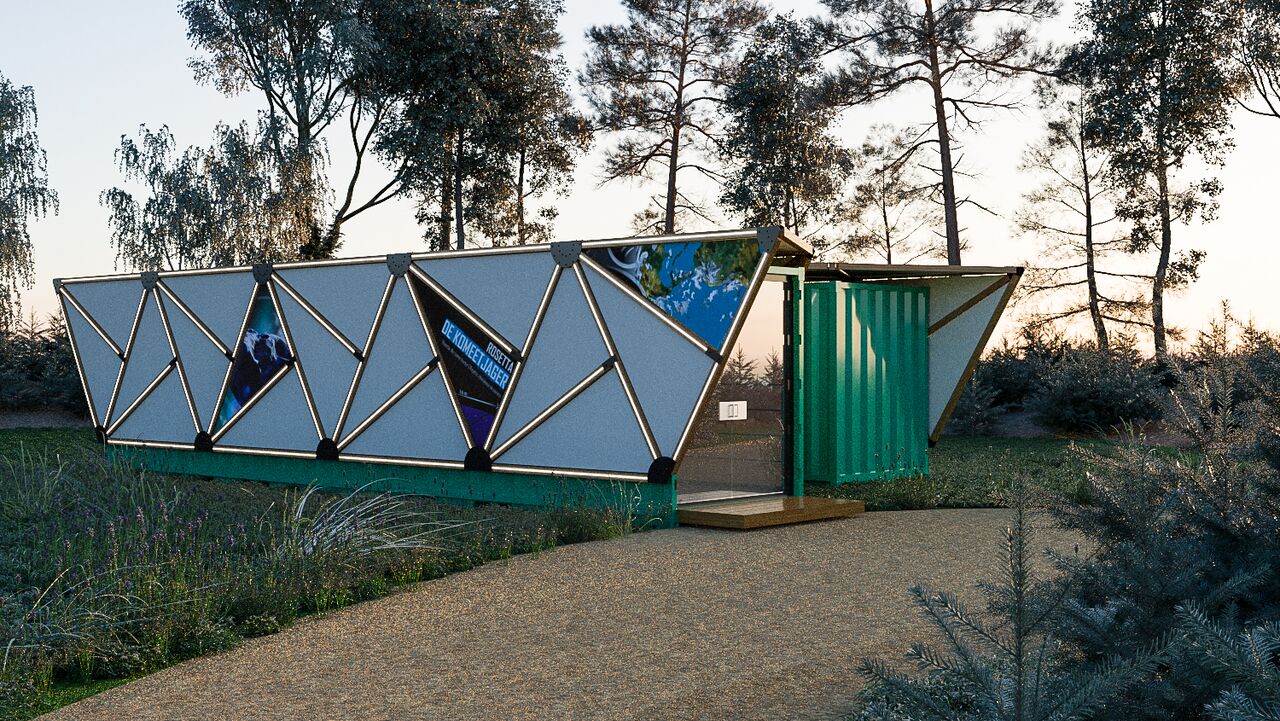By Kyra Romero, Pedro Russo and Iris Nijman, Astronomy & Society Group, Leiden University, the Netherlands
E-mail: [email protected]
 Open Science Centre architecture views
Open Science Centre architecture views
Science and innovation improves the world we live in. Fascination for science should not be confined to scientists themselves. Appropriate communication about science and technology will keep the general public in touch with the field and abreast of developments.1Unfortunately many communities around the world are not engaged with science and technology. At the same time some of the most advanced Observatories in the world are located in remote (and many times disadvantaged) regions. It is important that the astronomy community finds ways to engage the communities in those regions with science and technology. This was the main motivation for the Universe Awareness programme at Leiden University in the Netherlands to start the development of Open Science Centre.
Open Science Centre is an open platform for STEAM2 education that fosters sustainable development of local communities. This engaging learning space is based on open standards: open architecture, open education, open technology & open science. Open Standards are processes, protocols or resources made available to the general public and are developed (and/or approved) and maintained via a collaborative and consensus driven process.3 Open Science Centre will follow the same approach.
We are designing Open Science Centre for low-income and/or remote communities, but the OSC is open to everyone and can be established everywhere. As a proof of concept we are developing an Open Science Centre at the LOFAR observatory4 core in the northern part of the Netherlands to be opened in Spring 2017, but already discussing possibilities with partners in Portugal, Brazil, Mozambique and other countries.
Open Science Centre will be available in the following options:
- Do-it-Yourself OSC: Establish your own OSC. All the blueprints, plans, activities and ancillary resources are freely available under a creative commons license. A network of scientific, teachers, students, artists, and other professionals will be part of the online community to evaluate and improve all the content. Everyone can interact and download the information.
- Out-of-Box OSC: Educational activity kits will be available to transform any space (from a classroom to a garden) into an interactive and engaging science centre. These kits will be available at a target price of 50 EUR per theme.
- Full-Fledged OSC: A complete OSC is also available with all the necessary materials and equipment to open a science and technology centre in local communities. The Open Science Centre has a central versatile space, that can be used for workshops during school and group visits, and turned into a hands-on exhibition for walk-in public visits. OSC will have cutting-edge open technology including a small FabLab. The target price for the complete OSC is under 100,000 EUR.
The first exhibition for Open Science Centre is Open Perspectives: an interactive and localisable exhibition that provides a unique multidisciplinary context of the current knowledge about the Universe and the Human place in it. The first modules of the open-source exhibition will be available in late 2016.
How can I get involved?
Open Science Centre is a perfect space to run educational activities; maybe you can host your GAM2017 activities in your own OSC. Here is how you can do it:
- Adapt a room to an OSC. If you already have a space or a community room, we can provide you with ideas and plans on how to convert your space into an OSC.
- Start your own OSC in your local community, from the Do-it-yourself OSC option or with the Full-fledge OSC container option. Contact us to start your own Open Science Centre ([email protected])
- Join the OSC network, be part of the OSC community and support the development of our activities, exhibition and content. You can support by creating, sharing, improving, translating, commenting or testing our plans, activities, blueprints, strategies.
More information:
- Open Science Centre webpage: www.opensciencecentre.org
- Open Science Centre article: https://prc.nao.ac.jp/museum/symp2015/Proceedings/15.Russo-Romero.pdf
- UNAWE update: http://www.unawe.org/updates/unawe-update-1548/
- Contact us: [email protected]
________________________________________________________________
1 From: Netherlands Ministry of Education, Culture and Science 2014, Vision for Science Choices for the Future – 2025, Government of the Netherlands
2 STEAM, as defined in “Report to the European Commission of the Expert Group on Science Education: Science Education for Responsible Citizenship”: An educational and innovation framework bringing science, technology, engineering and mathematics together with the arts/other disciplines and types of learners with the goal of being more engaging, creative and naturally successful for all members of any educational system.
3 Rosen, L. “Defining Open Standards”, pp. 2-4.
4 www.lofar.org







